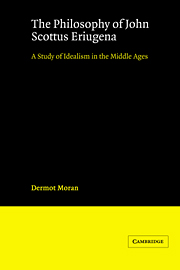Book contents
- Frontmatter
- Contents
- Preface
- Acknowledgments
- Chronology
- List of abbreviations
- 1 European intellectual culture in the ninth century
- 2 The predestination debate
- 3 Eriugena's life and early writings
- 4 The Greek awakening
- 5 The Periphyseon
- 6 Eriugena as philosopher
- 7 Eriugena's sources
- 8 Dialectic, philosophy, and the life of the mind
- 9 The meaning of human nature
- 10 Self-knowledge and self-definition: the nature of human knowing
- 11 The meaning of non-being
- 12 The meaning of nature
- 13 Eriugena's influence on later mediaeval philosophy
- 14 Conclusion
- Bibliography
- Index nominum
- Index rerum
9 - The meaning of human nature
Published online by Cambridge University Press: 05 June 2012
- Frontmatter
- Contents
- Preface
- Acknowledgments
- Chronology
- List of abbreviations
- 1 European intellectual culture in the ninth century
- 2 The predestination debate
- 3 Eriugena's life and early writings
- 4 The Greek awakening
- 5 The Periphyseon
- 6 Eriugena as philosopher
- 7 Eriugena's sources
- 8 Dialectic, philosophy, and the life of the mind
- 9 The meaning of human nature
- 10 Self-knowledge and self-definition: the nature of human knowing
- 11 The meaning of non-being
- 12 The meaning of nature
- 13 Eriugena's influence on later mediaeval philosophy
- 14 Conclusion
- Bibliography
- Index nominum
- Index rerum
Summary
Instead of beginning directly with a discussion of the meaning of the four divisions of nature, as most commentators have done, I began with Eriugena's concept of philosophy and dialectic in order to show the strong intellectualist and idealist meaning he gives to the understanding of the practice of philosophy and the interpretation of human nature primarily as mind. We must now examine his theory of human nature more closely. In this chapter I shall argue that Eriugena seems to be giving a dualistic account of human nature, in terms of perfect and fallen human states, but in fact he does not conceive of these states as ontological entities; rather they will be two different points of view for human beings. Perfect human nature exists only as possibility; fallen human nature exists only as illusion. True human nature is the multiplex theoria we discussed in the preceding chapter. These human states therefore are states of mind and result from different human theoriae, different human contemplations or perspectives on the one ideal reality. In fact, as we shall see, we cannot strictly speak of an “ideal reality,” since Eriugena's uniqueness lies in his concept of an ideal non-reality or nothingness which is the true ground of all being and all actuality. Later in the Homilia Eriugena talks of three worlds – the material, the spiritual, and the world where spirit and matter are joined.
- Type
- Chapter
- Information
- The Philosophy of John Scottus EriugenaA Study of Idealism in the Middle Ages, pp. 154 - 185Publisher: Cambridge University PressPrint publication year: 1989



